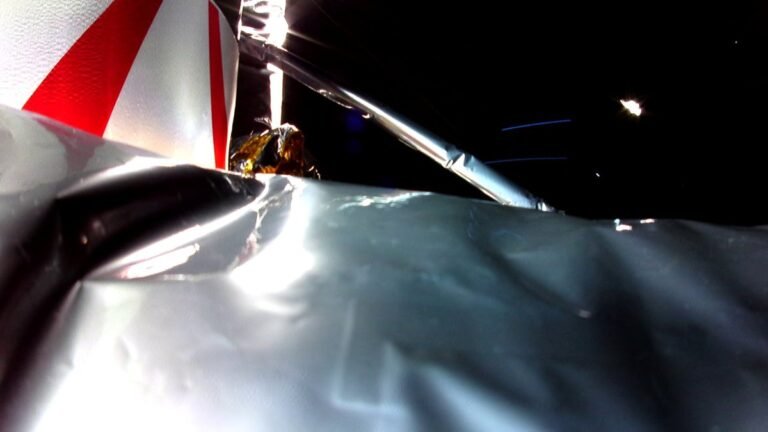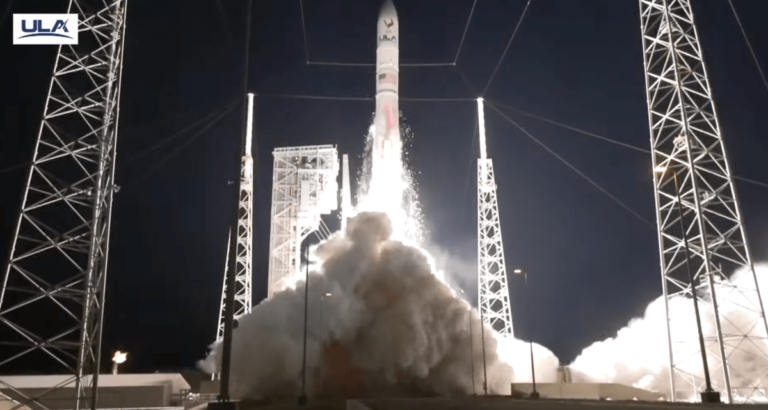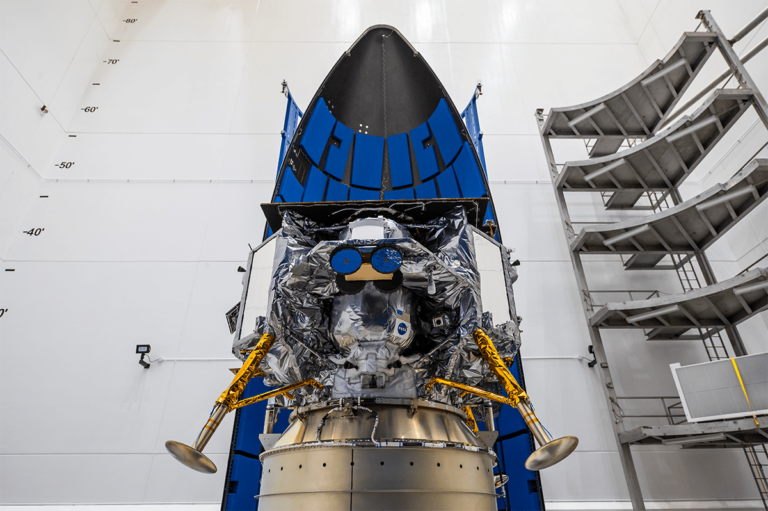
Astrobotic’s lunar lander will be reentering Earth’s atmosphere over a remote part of the South Pacific Ocean tomorrow afternoon, bringing to a close the failed moon landing mission.
Pittsburgh-based Astrobotic has been providing frequent updates on the Peregrine lunar lander since it launched on United Launch Alliance’s Vulcan Centaur on January 8.
The source of the anomaly was an ongoing propellant leak, which were preventing Peregrine from pointing its solar arrays at the sun.
But by the time it reenters the atmosphere tomorrow, Peregrine will have operated in space for over ten days.
Due to the propellant leak, Astrobotic said it had devised a two-step process to maneuver the spacecraft to the projected trajectory for reentry.

Astrobotic’s Peregrine lunar lander is still operating on orbit, with the company saying there is “growing optimism” that the spacecraft could survive in space longer than the current estimate.
The Pittsburgh-based startup has been releasing a series of updates to social media platform X since the spacecraft’s launch in the early hours of Monday morning.
Shortly after separating from the launch vehicle, United Launch Alliance’s Vulcan Centaur, engineers immediately started encountering issues.
But despite all odds, Peregrine has been operational in space for more than four days, and the estimated operational time remaining continues to extend.
The remaining 10 payloads on board are passive, and do not require power or communications from the spacecraft.

All eyes are on United Launch Alliance and Pittsburgh-based startup Astrobotic this week, with the two companies gearing up for inaugural missions with huge stakes.
The launch features two firsts: the first flight of ULA’s Vulcan Centaur rocket, and the first time Astrobotic is attempting to put hardware on the moon.
If Astrobotic is successful, it would be the first time a private company has put a spacecraft on the moon.
Countdown Capital, an early-stage venture capital firm focused on hard tech industrial startups, will shut down by the end of March and return uninvested capital, firm founder and solo general partner Jai Malik said in an annual letter.
In addition to the ULA/Astrobotic launch mentioned above, this past week also saw the launch of the first six Starlink satellites equipped for direct-to-cell connectivity.

In a devastating series of updates earlier today, the Pittsburgh-based startup said a “failure within the propulsion system” is causing a critical loss of propellant.
The propulsion system is a critical component of a spacecraft, but it’s especially important for this mission, which is taking an indirect path to the moon.
NASA, likely sensing the difficulty of a moon landing, has issues awards to multiple companies under the program.
Other awardees include Intuitive Machines, which is set to make its own lunar landing attempt next month, and Firefly Aerospace, which will conduct its first lunar mission later this year.
A deputy administrator from NASA’s Science Mission Directorate, Joel Kearns, said in a statement after launch that “each success and setback are opportunities to learn and grow.

The company’s next-generation rocket Vulcan Centaur successfully lifted off in the early hours of Monday, and its primary payload, a lunar lander from Astrobotic, is now on its way to the moon.
The heavy-lift rocket took off from Cape Canaveral Space Force Center at 2:18 AM EST Monday.
The Centaur executed two more burns to get Astrobotic’s Peregrine lander on the correct trajectory to the moon.
With those complete, the lander, called Peregrine, will now embark on a one-and-a-half month journey to the moon.
The launch and subsequent journey to the moon are a watershed moment for both United Launch Alliance and Astrobotic.

United Launch Alliance’s Vulcan Centaur rocket has been rolled to the launch pad at Cape Canaveral Space Force Station ahead of its early Monday morning launch, a mission that could end with the first fully private spacecraft landing on the moon.
Vulcan’s primary payload is Astrobotic’s Peregrine lunar lander.
The two companies had been targeting a Christmas Eve launch, but ULA decided to postpone due to ground system issues.
“We are ready for launch, and for landing.”ULA and Pittsburgh-based Astrobotic are not the only firms with much riding on Monday’s launch.
That program, Commercial Lunar Payload Services (CLPS), has collectively doled out hundreds of millions to spur private development of moon landers.

Astrobotic’s first lunar lander is ready for lift-off.
The company announced Tuesday that the lander, called Peregrine, has completed final checkouts and fueling after it was mated with United Launch Alliance’s Vulcan Centaur rocket last month.
Astrobotic is executing the mission as part of a $79.5 million contract from NASA under the agency’s Commercial Lunar Payload Services (CLPS) program.
Pittsburgh-based Astrobotic is one of a handful of commercial players betting that there will be a thriving market for lunar payload delivery services.
Other companies include Intuitive Machines, which is aiming to launch its first lander just days after Peregrine, on January 12, as well as Firefly Aerospace and Japanese firm ispace, which had a failed lunar launch earlier this year.










